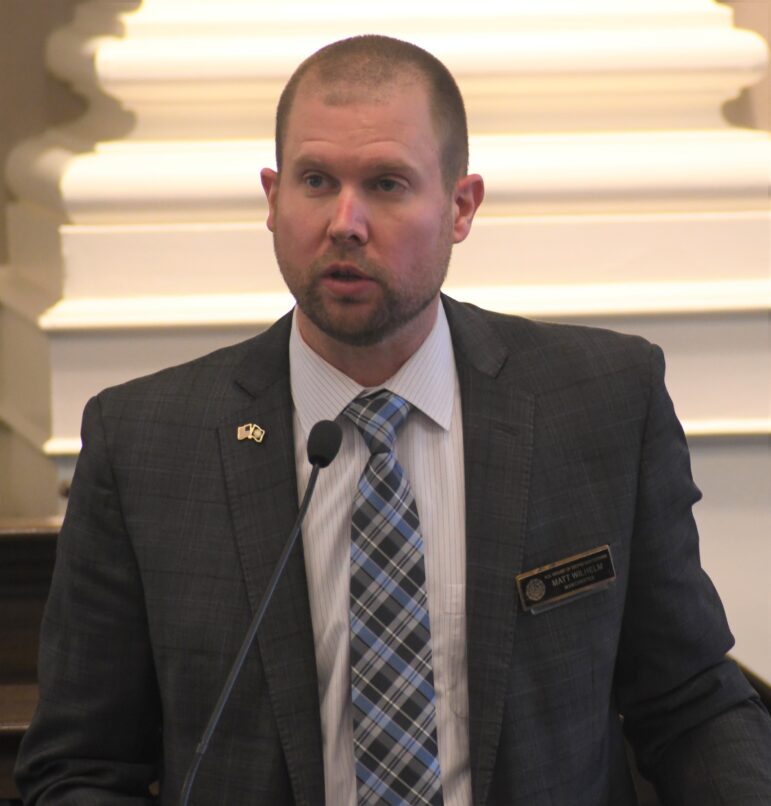
CONCORD, N.H. – The New Hampshire House of Representatives looks like it’s ready to get back to the way things were prior to the COVID-19 pandemic, with some minor tweaks.
With initial organization for the session out of the way, the House got to work codifying the set of rules they will use over the next biennium on Wednesday morning, with several proposed amendments to list of over 100 current House rules established by previous sessions of the House. Here are a few of the highlights.
Proxy Voting
Democratic House Leader Matt Wilhelm (D-Manchester) championed a rule change that would have allowed state representatives who are ill with COVID-19 or other serious illnesses or caring for other serious illnesses designate a “proxy” representative who could cast their vote. Representatives could be a proxy for only one other member in the proposal.
Wilhelm said that given narrow margins between Democrats and Republicans this session, many representatives may feel pressured to attend a vote in person, potentially endangering their colleagues. He added that anyone found using the process for illegitimate means could be referred for an ethics hearing.
He added that other state legislatures and Congress were already following similar practices.
Deputy House Speaker Steven Smith (R-Charlestown) said that constituents expect their elected officials to show up and cast a vote in person and the definition of an illness was vague, leading some representatives to ask for proxy votes for potentially minor illnesses.
Smith also added that there were no guidelines for the proxy representative being required to vote the same way the original representative would have, which he believed could lead to abuse.
That proposal failed by a vote of 204-171.
Remote Hearings
A proposal by Karen Ebel (D-New London) also asked for the ability for Speaker Packard to allow for remote hearings if needed. Smith repeated his belief that constituents expect their representatives to hold in-person meetings and felt that remote meetings may violate the state’s open meeting laws without a state of emergency in place. Smith also indicated that unfamiliarity with remote meeting technology led to occasionally unprofessional situations during the pandemic.
This proposal failed by a vote of 195-180.

Committee Chair Reports During Deadlocks
A change to Rule 46c that would allow committee chairs to provide committee reports and recommended motions when a committee cannot provide a report on whether a be should recommended as “ought to pass” or “inexpedient to legislate”
Joe Sweeney (R-Salem) spoke in favor of the proposal, noting the close partisan division of the House this session, which would likely create many split committee votes and thus no recommendation reports. He added that the proposal would empower committees.
Lucy Weber (D-Charlestown) said that the measure would potentially negate the opinions of others on those committees, particularly Democrats since Republicans hold all chairmanships despite the House’s narrow majority.
A motion to table the amendment failed 188-188, after House Speaker Sherman Packard (R-Londonderry) cast his vote in opposition, allowing additional discussion.
A motion to pass the amendment failed 191-184 and then Weber asked for reconsideration of the motion and requested others vote against it so it could not be brought forth again. The reconsideration vote passed 193-182.
Concealed Weapons
David Meuse (D-Portsmouth) requested that the ability of no one, except for on-duty law enforcement officials, should be able to carry or have a weapon in their possession in the House chamber, gallery and nearby rooms.
The current rule allows for concealed possession of a weapon.
Wilhelm and Meuse said that law enforcement officials are trained to keep others safe and possession of firearms by others could result in accidents or people getting unintentionally shot while those possessing concealed weapons responded to assailants.
Terry Roy (D-Deerfield) and J.R. Hoell (R-Dunbarton) said that judicial precedent indicating that constitutional rights to bear arms supersede House rules and in emergencies, law enforcement officials may be too far away to provide protection where it is needed.
This motion failed 197-177.
Replacing “Prayer” with “Invocation”
Sherry Dutzy (D-Nashua) asked for the word “prayer” to replaced with “invocation” in regard to the words provided at the beginning of each legislative day.
Dutzy said that this change would retain the same meaning intended by the rule while replacing a religious connotation with a spiritual one that is more inclusive. She was supported by Alexis Simpson (D-Exeter). Kevin Verville (R-Deerfield) spoke in opposition, citing 200 years of tradition related to the rule.
This amendment failed 190-183.







